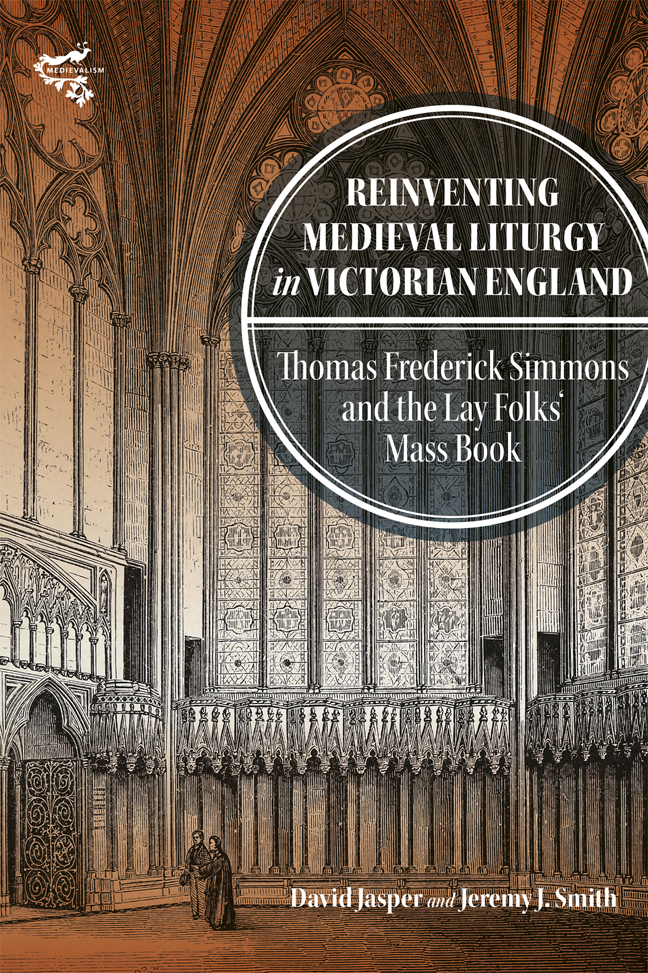 Reinventing Medieval Liturgy in Victorian England
Reinventing Medieval Liturgy in Victorian England Book contents
- Frontmatter
- Dedication
- Contents
- List of Plates
- Preface
- A note on citations
- List of abbreviations
- Introduction: Imagining the Past
- 1 Thomas Frederick Simmons and The Lay Folks’ Mass Book
- 2 Re-imagining Medieval Devotion: Nineteenth-Century Conceptions of the English Church
- 3 Simmons and the Early English Text Society
- 4 Simmons as Editor: The Philologist
- 5 Simmons as Editor: The Liturgist
- 6 Simmons as Parish Priest, and Liturgical Reform in the Victorian Church of England
- 7 The Afterlives of The Lay Folks’ Mass Book
- Conclusion: Liturgical Moments in Time
- Plates
- Appendix I The Lay Folks’ Mass Book: Text and Translation
- Appendix II The Lay Folks’ Mass Book and the Sarum Rite
- Bibliography
- Index
- Miscellaneous Endmatter
2 - Re-imagining Medieval Devotion: Nineteenth-Century Conceptions of the English Church
Published online by Cambridge University Press: 02 March 2024
- Frontmatter
- Dedication
- Contents
- List of Plates
- Preface
- A note on citations
- List of abbreviations
- Introduction: Imagining the Past
- 1 Thomas Frederick Simmons and The Lay Folks’ Mass Book
- 2 Re-imagining Medieval Devotion: Nineteenth-Century Conceptions of the English Church
- 3 Simmons and the Early English Text Society
- 4 Simmons as Editor: The Philologist
- 5 Simmons as Editor: The Liturgist
- 6 Simmons as Parish Priest, and Liturgical Reform in the Victorian Church of England
- 7 The Afterlives of The Lay Folks’ Mass Book
- Conclusion: Liturgical Moments in Time
- Plates
- Appendix I The Lay Folks’ Mass Book: Text and Translation
- Appendix II The Lay Folks’ Mass Book and the Sarum Rite
- Bibliography
- Index
- Miscellaneous Endmatter
Summary
The Origins of the Prayer Book
Simmons’ Engagement With the LFMB was profoundly linked to his understanding of the ‘catholic and apostolic’ Church of England, driven by a powerful historical imagination. All historians, liturgists and theologians necessarily see the past from their own perspectives, and it is therefore unsurprising that this imagination derived from Simmons’ own cultural formation in Oxford. This culture was infused with a Romantic conception of the Middle Ages, derived from earlier antiquarianism, but specifically directed to liturgical theology and ecclesiology. Within it, it might be said, Simmons, as a parish priest trying to develop the devotional life of his own parishioners, was seeking in the LFMB something with the authority and status of the Prayer Book itself. It was, after all, part of the later medieval tradition from which the Anglican Prayer Book emerged in the middle of the sixteenth century.
Where this culture largely derived from is illustrated by what may now be perceived as a significant event in nineteenth-century English church history. In 1823, Oxford’s Regius Professor of Divinity, Charles Lloyd (1784–1829), later to become Bishop of Oxford (1827–9), delivered a course of private lectures on the history of the Anglican Book of Common Prayer (hence BCP). His earnest audience of university graduates and students included figures who later, through their involvement in the Oxford Movement, were to become influential, indeed dominant, in nineteenth-century English religious life: John Henry Newman (whom we have already encountered), Edward Bouverie Pusey (1800–82), Richard Hurrell Froude (1803–36), Isaac Williams (1802–65), Robert Isaac Wilberforce (1802–57) and Frederick Oakley (1802–80).
Lloyd’s influence on his students was profound. Indeed, he was also instrumental, a couple of years later, in causing Pusey to study theology in Germany: a key event in the Oxford Movement’s evolution. In these lectures, Lloyd sought to demonstrate that the sources of the Church of England’s BCP were both primitive and medie-val, implying the continuity of the English Church from pre- to post-Reformation times. His listeners were encouraged to study the medieval Breviary and Missal, and both Newman and Pusey began to use the Roman Breviary in the 1830s.
Lloyd’s scholarly engagement with the sources of the BCP also had a significant posthumous afterlife.
- Type
- Chapter
- Information
- Reinventing Medieval Liturgy in Victorian EnglandThomas Frederick Simmons and The 'Lay Folks' Mass Book', pp. 27 - 50Publisher: Boydell & BrewerPrint publication year: 2023


